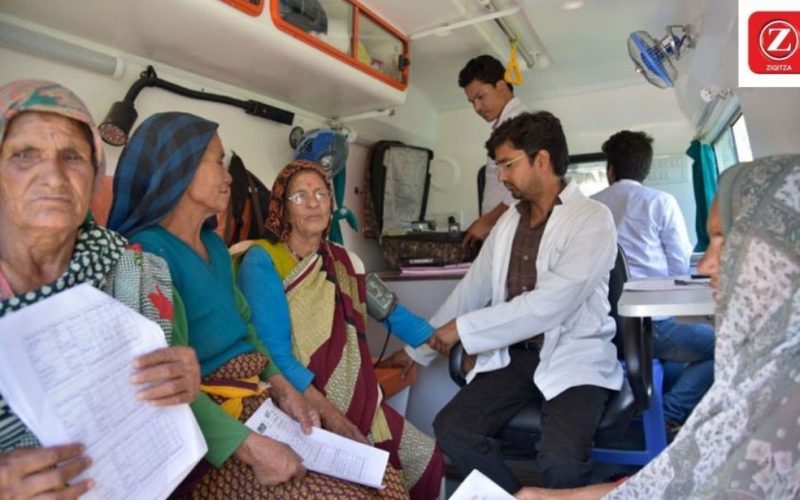India’s population is diverse and is dispersed over a land area of 3.28 million kms, from the Himalayan Mountains to Kerala’s backwaters. As a result, access to healthcare is somewhat skewed across the entire nation, which causes people to swarm to major cities like Delhi, Mumbai, Bangalore, and Chennai.
Ziqitza HealthCare explains that in India, access to healthcare services is also heavily biased toward urban areas. This means that a large portion of our population is significantly underserved when it comes to even primary healthcare in a country where the majority of the population lives in rural areas.
Ziqitza further points out that the current healthcare system will struggle to provide adequate and equitable health services if new models are not investigated and put into practice for meeting the population’s health needs. Additionally, achieving the Sustainable Development Goals (SDGs) and the targets established under the National Health Mission depend on equitable access to healthcare and the distribution of health services (NHM).
Mobile Medical Units (MMUs) are regarded as a cutting-edge healthcare delivery model that may help reduce health disparities among vulnerable populations and people with chronic illnesses. In fact, some studies have found that MMUs have a greater impact when they provide emergency care, conduct preventative health screenings, and initiate the management of chronic diseases. Ziqitza HealthCare Ltd explains that by opening their doors directly into communities and leveraging existing community resources, MMUs can provide specialised, high-impact, and affordable health care that dynamically responds to the community’s changing needs.
Mobile Medical Units are thus frequently set up to guarantee accessible healthcare and to ensure a decentralized approach to healthcare. Mobile Medical Units, which provide essential services, have aided in the mobilization of healthcare to “conduct screenings, basic diagnosis, and occasionally complex medical treatments closer to people’s homes.” With minimal expense and relatively fewer operational bottlenecks, the same is effectively imaginable across all terrains, communities, and socioeconomic groups.
Ziqitza Rajasthan explains that Mobile Medical Units (MMUs) are viewed as a key strategy under the National Health Mission to facilitate access to public health care, particularly for people living in remote, challenging, under-served, and unreached areas. This strategy aims to bring healthcare to people’s homes, especially in rural, vulnerable, and underserved areas. This is not intended for patient transfers.
Ziqitza further points out that through the provision of a suggested package of services under 12 thematic areas – maternal health, neonatal and infant health, child and adolescent health, reproductive health and contraceptive services, management of chronic communicable diseases, management of common communicable diseases and basic OPD care (acute simple illnesses), management of common non-communicable diseases—MMU services are intended to meet the technical and service quality standards for a primary health centre. In addition to facilitating referrals, these services are offered free of charge through MMUs.
Ziqitza Limited explains that, in most cases, each MMU has one vehicle. However, if there is more than one vehicle:
- One vehicle transports medical and para-medical personnel.
- The second vehicle transports equipment/accessories and basic laboratory facilities.
- The third vehicle transports diagnostic equipment such as an X-ray machine, an ultrasound machine, an ECG machine, and a generator.
Under the aegis of the National Health Mission, the population norm for MMU deployment calls for 1 MMU for every 10 lakh people, with a district-wide maximum of 5 MMUs. On the basis of the evaluation of the proposals submitted by the respective states in this regard, further relaxation of the norms is, however, available on a case-by-case basis where patients served through existing MMUs exceed 60 patients per day in plain areas and 30 patients per day in hilly areas. Within the parameters of the established financial norms, support is given to the states/UTS for MMUs’ capital and operating costs.
Ziqitza HealthCare has experience managing more than 150 MMUs in Jammu and Kashmir, Kerala, and Madhya Pradesh, three states with extremely diverse populations. Our MMUs are staffed with medical professionals who are equipped to offer free medical examinations and trained to identify the signs of common illnesses, perform a basic diagnosis, prescribe medication, and refer patients to specialised clinics in the event of further medical complications. Raising awareness, ensuring preventive vaccination, and encouraging regular medical check-ups among the rural population became possible with the availability of these vans.


